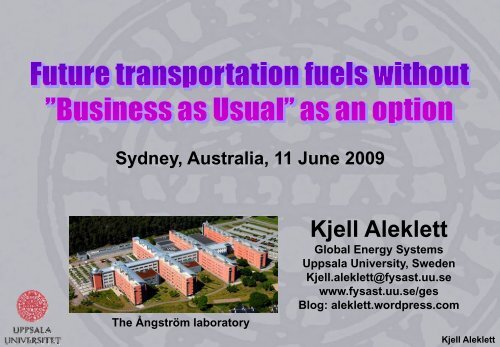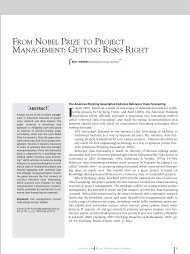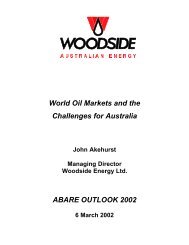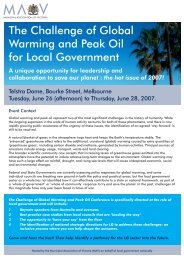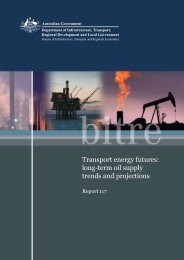Kjell Aleklett - ASPO Australia, Australian Association for the Study ...
Kjell Aleklett - ASPO Australia, Australian Association for the Study ...
Kjell Aleklett - ASPO Australia, Australian Association for the Study ...
You also want an ePaper? Increase the reach of your titles
YUMPU automatically turns print PDFs into web optimized ePapers that Google loves.
Sydney, <strong>Australia</strong>, 11 June 2009<br />
The Ångström laboratory<br />
<strong>Kjell</strong> <strong>Aleklett</strong><br />
Global Energy Systems<br />
Uppsala University, Sweden<br />
<strong>Kjell</strong>.aleklett@fysast.uu.se<br />
www.fysast.uu.se/ges<br />
Blog: aleklett.wordpress.com<br />
<strong>Kjell</strong> <strong>Aleklett</strong>
Uppsala Global Energy<br />
Systems<br />
Web page: www.fysast.uu.se/ges<br />
<strong>Kjell</strong> <strong>Aleklett</strong>
<strong>Kjell</strong><br />
<strong>Kjell</strong> <strong>Aleklett</strong>
<strong>Kjell</strong> [ ]<br />
<strong>Kjell</strong> <strong>Aleklett</strong>
<strong>ASPO</strong> International<br />
The <strong>Association</strong> <strong>for</strong> <strong>the</strong> <strong>Study</strong> of Peak Oil & Gas<br />
<strong>Kjell</strong> <strong>Aleklett</strong>
Argentina, <strong>Australia</strong>, Belgium, Canada, China,<br />
France, Germany, Great Brittan, Hong Kong,<br />
Ireland, Israel, Italy, Kuwait, Mexico, New<br />
Zeeland, Portugal, South Korea, Sweden,<br />
Switzerland, South Africa, The Ne<strong>the</strong>rlands, USA<br />
<strong>Kjell</strong> <strong>Aleklett</strong>
National <strong>ASPO</strong> groups<br />
<strong>Kjell</strong> <strong>Aleklett</strong>
<strong>ASPO</strong> – The <strong>Association</strong> <strong>for</strong> <strong>the</strong> <strong>Study</strong> of Peak Oil&Gas<br />
"The term Peak Oil refers <strong>the</strong> maximum rate of <strong>the</strong><br />
production of oil in any area under consideration,<br />
recognising that it is a finite natural resource, subject<br />
to depletion."<br />
<strong>Kjell</strong> <strong>Aleklett</strong>
First Press Release from <strong>ASPO</strong> 2002<br />
Production, Gboe/a<br />
50<br />
40<br />
30<br />
20<br />
10<br />
0<br />
NGLs<br />
Polar Oil<br />
Deep Water<br />
Heavy<br />
Conventional<br />
87 million barrels per day<br />
1930 1950 1970 1990 2010 2030 2050<br />
“The world oil depletion curve, above, is based on all available<br />
in<strong>for</strong>mation on oil reserves and estimates of <strong>the</strong> amounts yet-tofind,<br />
and indicates that world oil production will reach a peak (87<br />
million barrels per day) around 2010 and decline <strong>the</strong>reafter.”<br />
<strong>Kjell</strong> <strong>Aleklett</strong>
<strong>Kjell</strong> <strong>Aleklett</strong>
Statement by <strong>the</strong> Swedish Prime<br />
Minister Göran Persson, 2005<br />
“The oil might be in decline? We<br />
have someone here in Uppsala<br />
named <strong>Aleklett</strong> that claims that.”<br />
The Swedish government has appoint<br />
a commission that suggested what to<br />
do to make Sweden less dependent on<br />
oil by 2020.<br />
<strong>Kjell</strong> <strong>Aleklett</strong>
The commission proposes <strong>the</strong><br />
following national objectives <strong>for</strong><br />
more efficient use of energy and<br />
reduce dependence on oil by 2020<br />
• Swedish society as a whole should be able to make 20 per cent more<br />
efficient use of energy by 2020 and <strong>the</strong>reby at <strong>the</strong> same time create<br />
intensified, cost-efficient prosperity that is sustainable in <strong>the</strong> long term.<br />
• By 2020 in principle no oil should be used <strong>for</strong> heating residential and<br />
commercial buildings.<br />
• Road transport, including transport in agricultural, <strong>for</strong>estry,<br />
fisheries, and building sectors, should reduce use of petrol and diesel by<br />
40-50 per cent by 2020.<br />
• Industry should reduce its use of oil by 25-40 per cent by2020.<br />
<strong>Kjell</strong> <strong>Aleklett</strong>
Be<strong>for</strong>e <strong>the</strong> oil age, Sweden 1945<br />
When I was born in 1945, none of <strong>the</strong> four small farms in my little Swedish<br />
village used oil <strong>for</strong> anything. Ten years later, <strong>the</strong> oil age had arrived: we<br />
had replaced coal with oil <strong>for</strong> heating, my fa<strong>the</strong>r had bought a motorcycle,<br />
and tractors were seen in <strong>the</strong> fields.<br />
<strong>Kjell</strong> <strong>Aleklett</strong>
TWh<br />
700<br />
600<br />
500<br />
400<br />
300<br />
200<br />
100<br />
Energy in Sweden during 100 years<br />
0<br />
A factor of five<br />
Coal<br />
Nuclear<br />
Oil and gas<br />
Hydro<br />
1900 1920 1940 1960 1974 1982 1990 1998<br />
From 1945 to 1970, Sweden increased its use of energy by a factor of five, or<br />
nearly 7 percent per year <strong>for</strong> 25 years. This journey into <strong>the</strong> oil age trans<strong>for</strong>med<br />
Sweden from a ra<strong>the</strong>r poor country into <strong>the</strong> third wealthiest country (per capita)<br />
in <strong>the</strong> world. Ninety percent of <strong>the</strong> energy increase came from oil. Cheap oil<br />
made Sweden rich.<br />
Bio<br />
<strong>Kjell</strong> <strong>Aleklett</strong>
Use of oil products in Sweden<br />
Gasolin<br />
Heavy fuel oil 1<br />
Heavy fuel oil 2-5<br />
Aviation fuel Diesel<br />
<strong>Kjell</strong> <strong>Aleklett</strong>
Energy <strong>for</strong> transportations in Sweden<br />
Heavy fuel oil<br />
Natural gas Ethanol<br />
Aviation fuel<br />
Electricity<br />
Heavy fuel oil<br />
Gasolin<br />
Diesel<br />
<strong>Kjell</strong> <strong>Aleklett</strong>
World Oil Supply<br />
<strong>Kjell</strong> <strong>Aleklett</strong>
One barrel oil<br />
159 liter<br />
1.600 kWh<br />
Global production 2006: 85.000.000 per day,<br />
or 13.500.000 m 3 per day<br />
A typical super<br />
tanker takes 2<br />
million barrels and<br />
Japan needs to<br />
import oil equal to<br />
one super tankers<br />
every 10 th hour.<br />
Every day is 100<br />
tankers on way to<br />
Japan.<br />
<strong>Kjell</strong> <strong>Aleklett</strong>
Transport Fuels from Oil<br />
<strong>Kjell</strong> <strong>Aleklett</strong>
<strong>Kjell</strong> <strong>Aleklett</strong>
President Bush, Capitol Hill, 2006:<br />
“We have a serious problem.<br />
America is addicted to oil”<br />
“A World Addicted to Oil”<br />
<strong>Aleklett</strong>, Capitol Hill 19 Oct 2005<br />
<strong>Kjell</strong> <strong>Aleklett</strong>
How much energy is bound in oil?<br />
100 ml of oil contains 1 kWh<br />
What can you do with 1 kWh?<br />
You can move a small car to<br />
<strong>the</strong> top of <strong>the</strong> Eiffel Tower!<br />
A day’s work <strong>for</strong> a man is 0.5 kWh<br />
Filling you car with 50 liter is<br />
equal to <strong>the</strong> energy you need<br />
to move 500 cars to top of<br />
<strong>the</strong> Tower or having 1000<br />
slaves pushing your car.<br />
<strong>Kjell</strong> <strong>Aleklett</strong>
50 liter gasoline is equal to <strong>the</strong> work<br />
of 1000 persons during one day<br />
<strong>Kjell</strong> <strong>Aleklett</strong>
Where to find fossil fuel<br />
<strong>Kjell</strong> <strong>Aleklett</strong>
<strong>Kjell</strong> <strong>Aleklett</strong>
The sixth meeting of <strong>the</strong> Global Roundtable on Climate Change,<br />
February 26-27, 2009, at Columbia University in New York.<br />
<strong>Kjell</strong> <strong>Aleklett</strong>
<strong>Kjell</strong> <strong>Aleklett</strong>
World Energy Outlook 2008, WEO 2008<br />
WEO 2008 was released on November 12 th .<br />
On page 51 <strong>the</strong> IEA states that<br />
“<strong>the</strong> results of <strong>the</strong>se analyses [prospects <strong>for</strong><br />
oil and gas production] are intended to<br />
provide policy makers, investors and end<br />
users with a rigorous quantitative framework<br />
<strong>for</strong> assessing likely future trends in energy<br />
markets”.<br />
<strong>Kjell</strong> <strong>Aleklett</strong>
World Crude Oil Production from<br />
Fields in Production<br />
<strong>Kjell</strong> <strong>Aleklett</strong>
World Energy Outlook 2008<br />
<strong>Kjell</strong> <strong>Aleklett</strong>
New field developments in WEO 2008<br />
Economical limits<br />
<strong>Kjell</strong> <strong>Aleklett</strong>
Depletion rate of remaining reserves<br />
d δt = q t / (R 0 – Q t)<br />
where<br />
d δt = depletion rate of remaining reserves<br />
q t = production at time t<br />
R 0 = Initially present reserves or ultimate recoverable resources<br />
Q t = Cumulative up to time t<br />
<strong>Kjell</strong> <strong>Aleklett</strong>
Depletion (d δ) – North Sea<br />
<strong>Kjell</strong> <strong>Aleklett</strong>
Depletion (d δ) <strong>for</strong> fields to be<br />
developed in WEO 2008<br />
<strong>Kjell</strong> <strong>Aleklett</strong>
Production <strong>for</strong> fields to be developed<br />
with physical depletion (d δ) limits<br />
<strong>Kjell</strong> <strong>Aleklett</strong>
World Energy Outlook 2008<br />
<strong>Kjell</strong> <strong>Aleklett</strong>
Historical crude oil discovery<br />
114 billion barrels is OK<br />
121 bb (WEO 114 bb)<br />
<strong>Kjell</strong> <strong>Aleklett</strong>
Depletion (d δ) <strong>for</strong> fields<br />
Yet-To-Find in WEO 2008<br />
Production WEO2008: 19 Mb/d<br />
Our production in 2030: 9 Mb/d<br />
<strong>Kjell</strong> <strong>Aleklett</strong>
World Energy Outlook 2008<br />
<strong>Kjell</strong> <strong>Aleklett</strong>
Summary of future oil production<br />
<strong>Kjell</strong> <strong>Aleklett</strong>
WEO 2008 and<br />
Uppsala Oil<br />
Outlook 2008<br />
<strong>Kjell</strong> <strong>Aleklett</strong>
Uppsala Giant Oil Fields Scenarios –<br />
Worst and Best Case Production<br />
<strong>Kjell</strong> <strong>Aleklett</strong>
World Oil Production<br />
<strong>Kjell</strong> <strong>Aleklett</strong>
<strong>Kjell</strong> <strong>Aleklett</strong>
“Business as Usual”<br />
<strong>for</strong> <strong>the</strong> Aviation<br />
Industry<br />
<strong>Kjell</strong> <strong>Aleklett</strong>
Future Aviation Fuel<br />
Demand and Production<br />
Aviation fuel and future oil production scenarios, Emma Nygren, <strong>Kjell</strong><br />
<strong>Aleklett</strong>, Mikael Höök, Accepted by Energy Policy<br />
<strong>Kjell</strong> <strong>Aleklett</strong>
Can agriculture provide us with both<br />
food and fuel?<br />
Master <strong>the</strong>sis from<br />
Global Energy Systems<br />
Uppsala University, Sweden<br />
Kersti Johansson and Karin Liljequist<br />
Will soon be available at<br />
www.fysast.uu.se/ges<br />
<strong>Kjell</strong> <strong>Aleklett</strong>
Global agricultural production<br />
and scenarios <strong>for</strong> ethanol and biogas<br />
Global agricultural production and some scenarios <strong>for</strong> possible biogas and ethanol production<br />
compared to current consumption of fossil motor fuels and global food demand.<br />
TWh<br />
30000<br />
25000<br />
20000<br />
15000<br />
10000<br />
5000<br />
0<br />
<strong>Kjell</strong> <strong>Aleklett</strong>
Ethanol production from food<br />
Ethanol production if all maize, wheat and sugar crops<br />
are used as feedstock<br />
Crop Production [TWh ethanol]<br />
Global EU27 Sweden<br />
Maize 1600 130 0<br />
Wheat 1200 260 4<br />
Sugar beet 160 72 1.3<br />
Sugar cane 620 0.03 0<br />
All cereals and<br />
sugar crops<br />
5500 630 9.8<br />
<strong>Kjell</strong> <strong>Aleklett</strong>
Transportation needs and<br />
agricultural possibilities<br />
Using <strong>the</strong> total global production of certain crops as<br />
feedstock <strong>the</strong>se crops have been converted to different<br />
types of biofuels, and as a comparison we show <strong>the</strong> fossil<br />
fuels within <strong>the</strong> transport sector. The data is <strong>for</strong> 2006.<br />
TWh<br />
30000<br />
25000<br />
20000<br />
15000<br />
10000<br />
5000<br />
0<br />
1600<br />
Ethanol from<br />
maize<br />
620 400 250 276<br />
Ethanol from<br />
sugar cane<br />
Biodiesel from<br />
soy beans<br />
Biodiesel from<br />
oil palm fruit<br />
2006<br />
Consumption<br />
of biofuels <strong>for</strong><br />
transport<br />
25000<br />
Consumption<br />
of fuel <strong>for</strong><br />
transport<br />
<strong>Kjell</strong> <strong>Aleklett</strong>
2006<br />
Coal production <strong>for</strong>ecast and CTL<br />
<strong>Kjell</strong> <strong>Aleklett</strong>
CTL in South Africa<br />
150.000 b/d<br />
250.000 Mt/y<br />
<strong>Kjell</strong> <strong>Aleklett</strong>
Costs of CTL<br />
Estimated costs of CTL-industries in <strong>the</strong> US. The costs <strong>for</strong> emission<br />
reductions are not included, nor are government grants and funding.<br />
One 20 000 b/d plant One 80 000 b/d plant One Mb/d Industry<br />
Capital investment $1.5-$4 billions $6-$24 billions $60-$160 billions<br />
<strong>Kjell</strong> <strong>Aleklett</strong>
Global production scenarios <strong>for</strong> CTL<br />
Estimated coal consumption as a function of CTL capacity <strong>for</strong> 4 different<br />
conversion rations ranging from 1-3 barrels/ton. Current world coal<br />
production can be converted to 17-54 Mb/d, depending on assumed<br />
conversion ratio. However, practical experience indicates that <strong>the</strong> low or<br />
mean cases are <strong>the</strong> most realistic.<br />
<strong>Kjell</strong> <strong>Aleklett</strong>
CTL in <strong>Australia</strong><br />
Coal production in <strong>Australia</strong>: 401.000 Mt in 2008<br />
Coal <strong>for</strong> CTL: 100.000 Mt<br />
Investments: 10-30 b US$<br />
Liquids à la South Africa: 240.000 b/d<br />
<strong>Kjell</strong> <strong>Aleklett</strong>
President Barack Obama<br />
"No single<br />
issue is as<br />
fundamental<br />
to our future<br />
as energy”<br />
2009 Jan 26<br />
<strong>Kjell</strong> <strong>Aleklett</strong>
Dr. James R Schlesinger, <strong>for</strong>mer<br />
US Energy Secretary<br />
”And <strong>the</strong>re<strong>for</strong>e to <strong>the</strong> peakists I<br />
say, You can declare victory. You<br />
are no longer <strong>the</strong> beleagured<br />
small minority of voices crying in<br />
<strong>the</strong> wilderness. You are now main<br />
streams. You must learn to take<br />
yes <strong>for</strong> an answer and be gracious<br />
in victory.”<br />
Cork, Ireland, 2007 September 17<br />
<strong>Kjell</strong> <strong>Aleklett</strong>
We Have to Build a ”Crash Mat”<br />
<strong>Kjell</strong> <strong>Aleklett</strong>
The Historical “Peak Oil” Endgame<br />
The end of<br />
<strong>the</strong> Oil Age<br />
Oct 23rd 2003<br />
Leaders from The Economist printed edition<br />
On a time scale starting at year 0 and ending 4000 years later everyone agree that<br />
<strong>the</strong>re will be a peak in <strong>the</strong> oil production between 2000 and 2100<br />
<strong>Kjell</strong> <strong>Aleklett</strong>
Global Energy Systems<br />
Web page: www.fysast.uu.se/ges<br />
<strong>Aleklett</strong>’s Energy Mix: aleklett.wordpress.com<br />
E-mail: <strong>Kjell</strong>.aleklett@fysast.uu.se<br />
<strong>ASPO</strong>: www.peakoil.net<br />
<strong>Kjell</strong> <strong>Aleklett</strong>


